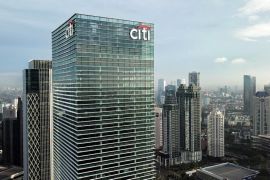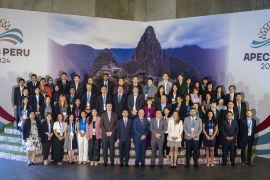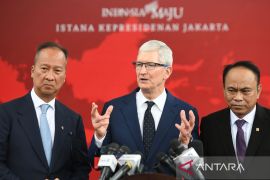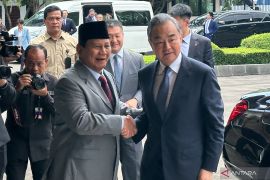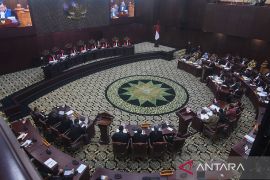"Our exports of completely built-up (CBU) cars to Vietnam are the biggest. Hence, Vietnam`s biggest car imports came from Indonesia," Marsudi said.Jakarta (ANTARA News) - Indonesia and Vietnam, the two neighboring countries in Southeast Asia, continue to increase bilateral ties in various fields, such as trade, investment, and other economic and social sectors.
"Our relations with Vietnam are not new. We have established friendly relations since the past 60 years. In 2013, we had set up a strategic partnership," Indonesian Foreign Minister Retno Marsudi stated in connection with the current visit of a Vietnamese top leader.
In order to further intensify bilateral ties, Secretary General of Vietnams Socialist Party Nguyen Phu Trong is on a three-day visit to Indonesia on Aug 22-24. He was welcomed in a ceremony led by President Joko Widodo (Jokowi) in Jakarta on Wednesday.
Minister Marsudi noted that Trong is visiting Indonesia to increase cooperation, particularly in the business sector. Indonesia views huge business potential between the two countries.
According to Marsudi, Indonesias trade with Vietnam has shown rapid growth. Cars are one of the biggest imports of the socialist country from Indonesia.
"Our exports of completely built-up (CBU) cars to Vietnam are the biggest. Hence, Vietnams biggest car imports came from Indonesia," Marsudi said after accompanying President Jokowi to receive Trong at the Merdeka Palace.
Despite the global economic slowdown, trade between Indonesia and Vietnam has shown encouraging growth, as was observed in the value of trade between the two countries reaching US$6.2 million in 2016.
Vietnam has a population of some 90-92 million, with an economic growth of six percent.
"We see several areas in trade where our exports are very strong," Marsudi revealed.
Apart from cars, Indonesias coal exports to Vietnam are also ranked the third biggest, recording 2.9 million tons in 2016 worth $141 million. Vietnams annual coal requirement reaches 47 million metric tons.
Vietnam is currently willing to continue to import coal from Indonesia as it needs the commodity to run its power plants. In 2020, Vietnam will need 86.4 million metric tons of coal. This means that Vietnams coal requirement will increase by 100 percent, so the import of the commodity from Indonesia should be stepped up.
"Vietnams coal imports from Indonesia will increase drastically from time to time," Marsudi noted.
Hence, during Trongs current visit to Indonesia, both nations agreed to cooperate in the coal business along with other sectors, such as education, rural development, and law and maritime security, as well as in gas utilization at the contingent borders.
Cooperation in the fields of coal and gas utilization at the contingent border was signed by Indonesias Minister of Energy and Mineral Resources Ignasius Jonan and Vietnamese Minister of Industry and Trade Tran Tuan Anh.
According to Marsudi, Vietnam needs to import gas from the Natuna Sea for which an agreement was signed at the Mardeka Palace.
Moreover, Vietnams investment in Indonesia is also relatively huge, reaching $500 million, most of which is in the property sector.
"We also already have a business deal on cement. Several of our investors will also enter Vietnam," she said.
The two countries, with a large population, have vast potential. They are both implementing reforms, building massive infrastructure projects, and developing their economies to boost growth. Indonesia has an average economic growth rate of five percent and Vietnam, six percent.
In order to further step up bilateral ties, President Jokowi and Trong are focusing on three main issues.
"Improvement of cooperation is in the fields of maritime and fisheries, trade, and investment," the president stated.
He said the meeting with Secretary General Trong and the delegation was open and productive.
"Since 2013, Indonesia and Vietnam are also part of the Association of Southeast Asian Nations (ASEAN), and Vietnam is currently the chair of the Asia-Pacific Economic Cooperation (APEC) and will host the APEC Summit in November 2017," he remarked.
On Wednesday, the two leaders also witnessed the signing of several memoranda of understanding (MoUs) for cooperation in five sectors.
The MoU in the field of coal and gas utilization at the contingent border was signed by Indonesias Minister of Energy and Mineral Resources Ignasius Jonan and Vietnamese Minister of Industry and Trade Tran Tuan Anh.
The agreement on education was signed by Vietnamese Deputy Prime Minister/Foreign Minister Pham Binh Minh and Indonesian Minister of Education and Culture Muhajir Effendy.
Indonesian Minister of Village Development, Underdeveloped Region, and Transmigration Eko Putro Sandjojo and Minister of Agriculture and Rural Development of Vietnam Nguyen Xuan Cuong signed the MoU on cooperation for rural development.
In the meantime, cooperation in the field of law was signed by Vietnams Justice Minister Le Thanh and Indonesian Minister of Law and Human Rights Yasonna Hamonangan Laoly.
On the occasion, Chief of Indonesians Sea Security Agency Arie Soedewo and Vietnamese Coast Guard Commander Lieutenant Nguyen also signed a joint letter of statement.
During the visit of the Vietnamese leader, Indonesia and Vietnam agreed to accelerate the negotiation process on the delimitation of the Exclusive Economic Zone between the two countries.
"Indonesia and Vietnam have agreed to speed up the negotiation process on delimitation of the Exclusive Economic Zone," President Jokowi noted.
In the fishery sector, both countries have agreed to cooperate to realize sustainable fisheries.
"We will cooperate in the efforts to crack down on illegal, unreported, and unregulated fishing (IUU Fishing)," he added.
Earlier, Jokowi and Trong had discussed the South China Sea issue. On the occasion, Jokowi highlighted the importance of maintaining unity and centrality of the ASEAN.
"We have spoken about the importance of working together as well as the 2025 vision of the ASEAN community and have also discussed the progress achieved in building a solid basis for the comprehensive norms regulation in the South China Sea," he noted.(*)
Reporter: Andi Abdussalam
Editor: Heru Purwanto
Copyright © ANTARA 2017
